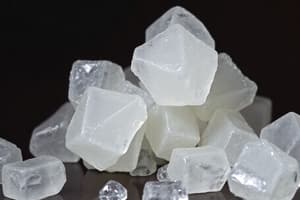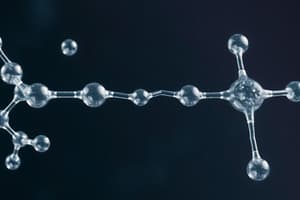Podcast
Questions and Answers
Which process allows galactose to be transformed into glucose?
Which process allows galactose to be transformed into glucose?
- Conversion in the liver (correct)
- Oxidation in the intestine
- Synthesis in the pancreas
- Fermentation in the stomach
What is the primary function of galactose in the mammary gland?
What is the primary function of galactose in the mammary gland?
- To make lactose (correct)
- To detoxify substances
- To produce glucose
- To assist digestion
Which of the following is produced when galactose undergoes mild oxidation?
Which of the following is produced when galactose undergoes mild oxidation?
- Galactonic acid (correct)
- Galacturonic acid
- Mucic acid
- Gluconic acid
How does glucuronic acid function in the body?
How does glucuronic acid function in the body?
What type of acid is produced when oxidation conditions are strong?
What type of acid is produced when oxidation conditions are strong?
Which sugar undergoes the same transformation as galactose under moderate oxidation conditions?
Which sugar undergoes the same transformation as galactose under moderate oxidation conditions?
What is a primary characteristic of mucic acid?
What is a primary characteristic of mucic acid?
Which of the following statements about derived carbohydrates is accurate?
Which of the following statements about derived carbohydrates is accurate?
Which sugar directly converts to gluconic acid under mild oxidation conditions?
Which sugar directly converts to gluconic acid under mild oxidation conditions?
Flashcards are hidden until you start studying
Study Notes
Galactose
- Sweetest sugar
- Converted to glucose in the liver
- Synthesized in the mammary gland to make lactose (milk sugar)
- Component of glycoproteins
Derived Carbohydrates
- Formed by chemical reactions from carbohydrates
- Examples: sugar acids
Sugar Acids
- Formed by oxidation of sugars
- Include aldonic acids, uronic acids, and saccharic acids
Aldonic Acids
- Formed by mild oxidation of sugars
- Glucose becomes gluconic acid
- Mannose becomes mannonic acid
- Galactose becomes galactonic acid
Uronic Acids
- Formed by moderate oxidation of sugars
- Glucose becomes glucuronic acid
- Mannose becomes mannuronic acid
- Galactose becomes galacturonic acid
- Glucuronic acid is used for detoxification and heteropolysaccharide synthesis
Saccharic Acids
- Formed by strong oxidation of sugars
- Glucose becomes glucosaccharic acid
- Mannose becomes mannaric acid
- Galactose becomes mucic acid
- Mucic acid forms insoluble crystals, used to identify galactose
Studying That Suits You
Use AI to generate personalized quizzes and flashcards to suit your learning preferences.




